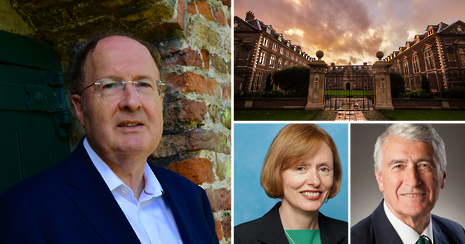College leaders divided over fate of Class Lists
College heads and Senior Tutors split over future of public grades, with the result of the Regent House vote expected later today

Documents circulated to members of Regent House reveal opinion among senior academics on whether or not publicly-displayed Class Lists ought to be abolished is very divided, just as it was among the student body.
Senior academics and administrative staff – who comprise Regent House, the University’s governing body – have until 5pm this evening to cast their vote in a ballot that will determine the future of Class Lists at Cambridge.
Six heads of colleges and seven Senior Tutors put their names to fly-sheets – documents which are circulated to members of Regent House prior to a vote that recommend members vote a particular way, be that ‘placet’ to accept the proposals before them (in this case, abolishing Class Lists), or ‘non placet’ to reject them.
Peculiarly, however, the fly-sheet that urges members to green-light the abolition of Class Lists does not mention the CUSU referendum held earlier this term, in which 55.23 per cent of students voted for the student union to adopt a policy of pushing for the Lists to be kept with an easier opt-out system, overruling a previous pro-abolition policy.
Furthermore, the metadata of a version of the ‘placet’ fly-sheet seen by Varsity that was circulated for academics to sign suggests that it was created on 29th October, before the start of the CUSU referendum on 1st November. The body of the fly-sheet is the same in both versions.
“It is clear,” the fly-sheet reads, “from the opinions expressed by many students, Senior Tutors, and others who deal with students in difficulties … that public display of class-lists causes unnecessary stress.”
The ‘non placet’ fly-sheet, on the other hand, does address the student referendum, saying: “It is clear that many students see the abolition of class-lists as depriving them of the public recognition of their achievements.”
Of the six college heads that signed a fly-sheet, only Ian White, the Master of Jesus College, and Stuart Laing, the Master of Corpus Christi College, advocated an end to the practice of posting Class Lists on the noticeboards outside Senate House.
Pushing for the retention of the Lists, on the other hand, are Lord Eatwell, the President of Queens’ College; Jane Stapleton, the Master of Christ’s College; Sir Alan Fersht, the Master of Gonville & Caius College; and Sir Gregory Winter, the Master of Trinity College.
The heads of the other 25 colleges were not among the signatories of any of the fly-sheets circulated to members of Regent House.
While opinion among those heads of colleges that felt compelled to add their name to a fly-sheet tended towards rejecting the University Council and General Board of the Faculties’ recommendation to abolish Class Lists, it would appear that Cambridge’s Senior Tutors are far more willing to relinquish the tradition.
Seven Senior Tutors (representing St Catharine’s, Hughes Hall, Girton, Wolfson, Lucy Cavendish, Jesus, and Magdalene) put their name to a fly-sheet, all backing the end of publicly-displayed Class Lists.
An eighth, Paul Wingfield, Senior Tutor at Caius, was among those advocating members vote against the proposals to scrap Class Lists, giving Caius the distinction of being the only college where both the Master and Senior Tutor have made a stand against abolishing the Lists.
Caius has become something of a bastion of pro-Class List sentiment, the two senior Caians joining student Jack Drury, a spokesperson for the ‘Save the Class List’ campaign, in their opposition to abolition.

Another hub of support for keeping Class Lists is the Faculty of Mathematics, with 21 of the 59 academics urging Regent House members to reject abolition belonging to either the Department of Applied Mathematics and Theoretical Physics (DAMTP) or Department of Pure Mathematics and Mathematical Statistics (DPMMS), which also contains the Statistical Laboratory.
The maths Tripos currently has a unique relationship with Class Lists, with results being read aloud at Senate House at the end of the year in a ceremony in which the top undergraduate is awarded the title of ‘Senior Wrangler’. Whether or not this has anything to do with the prevalence of maths faculty among the signatories of the ‘non placet’ fly-sheet, however, cannot be substantiated.
A total of 31 academics signed a fly-sheet advocating the abolition of Class Lists, of whom a majority (18) were members of either or both the University Council or the General Board of the Faculties – the two bodies below Regent House which have power over the University’s academic and educational policy.
St Catharine’s College emerged as something of a hot-spot for pro-abolition fervour, with five of the 13 non-University Council or General Board members that signed a fly-sheet recommending the end of publicly displayed Lists coming from the College, including the Senior Tutor and four Directors of Studies.
A majority of the University’s Pro-Vice-Chancellors – who form the core of the University’s academic leadership – also support the break with tradition, with Professor Graham Virgo, Professor Eilís Ferran and Professor Chris Abell supporting the recommendation to abolish Class Lists.
Whether or not academics were swayed by the result of this term’s CUSU referendum will soon be known, with a result just hours away.
 News / Eight Cambridge researchers awarded €17m in ERC research grants27 December 2025
News / Eight Cambridge researchers awarded €17m in ERC research grants27 December 2025 News / Downing investigates ‘mysterious’ underground burial vault 29 December 2025
News / Downing investigates ‘mysterious’ underground burial vault 29 December 2025 News / News in Brief: carols, card games, and canine calamities28 December 2025
News / News in Brief: carols, card games, and canine calamities28 December 2025 Sport / Hard work, heartbreak and hope: international gymnast Maddie Marshall’s journey 29 December 2025
Sport / Hard work, heartbreak and hope: international gymnast Maddie Marshall’s journey 29 December 2025 Interviews / Meet Juan Michel, Cambridge’s multilingual musician29 December 2025
Interviews / Meet Juan Michel, Cambridge’s multilingual musician29 December 2025






